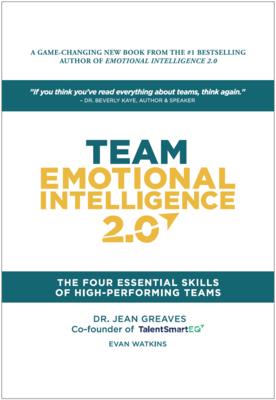structures, the pressure to develop high-performing teams is more critical than
ever. In the modern work environment, teams are expected to embrace change,
navigate complexity, and collaborate well under pressure ―all while delivering
exceptional results and forming productive relationships.While it is crucial to have talented, bright people within a
team, there is a dynamic that is even more essential to overall team
effectiveness. This dynamic is "Team Emotional Intelligence" (Team EQ). While
most people are familiar with emotional intelligence (EQ) when it comes to
individuals, the power of how EQ relates to the entire team has not been
well-understood until now.Insights from the latest research on team emotional
intelligence and TalentSmartEQ's research trends from working with over 200
teams (with 2000+ team members) combine to bring EQ know-how to the team level.
Team Emotional Intelligence 2.0 delivers practical strategies and showcases how
an emotionally intelligent team is far more than the sum of its parts. This
book focuses on the four key skill areas of Team EQ: Team Emotion Awareness,
Team Emotion Management, Internal Team Relationships, and External Team
Relationships, and it delivers 53 strategies and a step-by-step process for
increasing team EQ skills so team leaders and anyone who's a member of a team
can achieve peak performance and reach their goals.
Dr. Greaves, Evan Watkins, and their contributing team of
experts begin with a life and death story of team failure that illustrates how
emotions can drive team decisions and lead to disaster. They share a proven
approach to helping teams understand Team EQ skills, build these skills into
strengths, and use them to sustain positive momentum and achieve peak
performance. Strategies for remote and hybrid teams working virtually offer
targeted approaches to bonding, communicating, tough conversations, and
decision making as modern workplaces transform. Like she did with the best-selling
Emotional Intelligence 2.0 (at 2 million copies sold and counting), Dr. Greaves
and her team take complex concepts and translate them into easy-to-understand
skills that can be used immediately and developed further over time. As
organizations increasingly rely on getting work done through teams, the
understanding and development of team EQ skills is more relevant and impactful
than ever.
